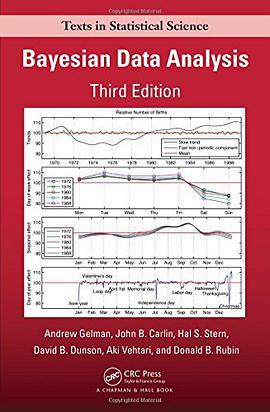Bayesian Data Analysis, Third Edition 豆瓣 Goodreads 谷歌图书
作者:
Andrew Gelman
/
John B. Carlin
…
Chapman and Hall/CRC
2013
- 11
This third edition of a classic textbook presents a comprehensive introduction to Bayesian data analysis. Written for students and researchers alike, the text is written in an easily accessible manner with chapters that contain many exercises as well as detailed worked examples taken from various disciplines. This third edition provides two new chapters on Bayesian nonparametrics and covers computation systems BUGS and R. It also offers enhanced computing advice. The book's website includes solutions to the problems, data sets, software advice, and other ancillary material.

